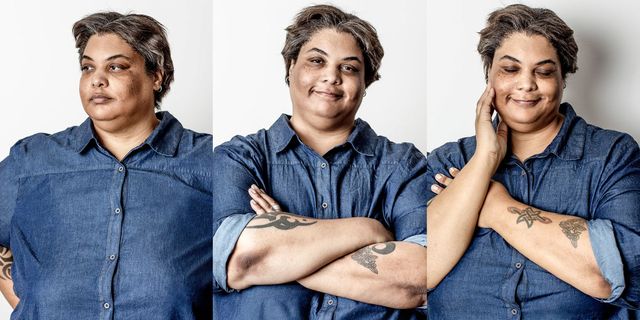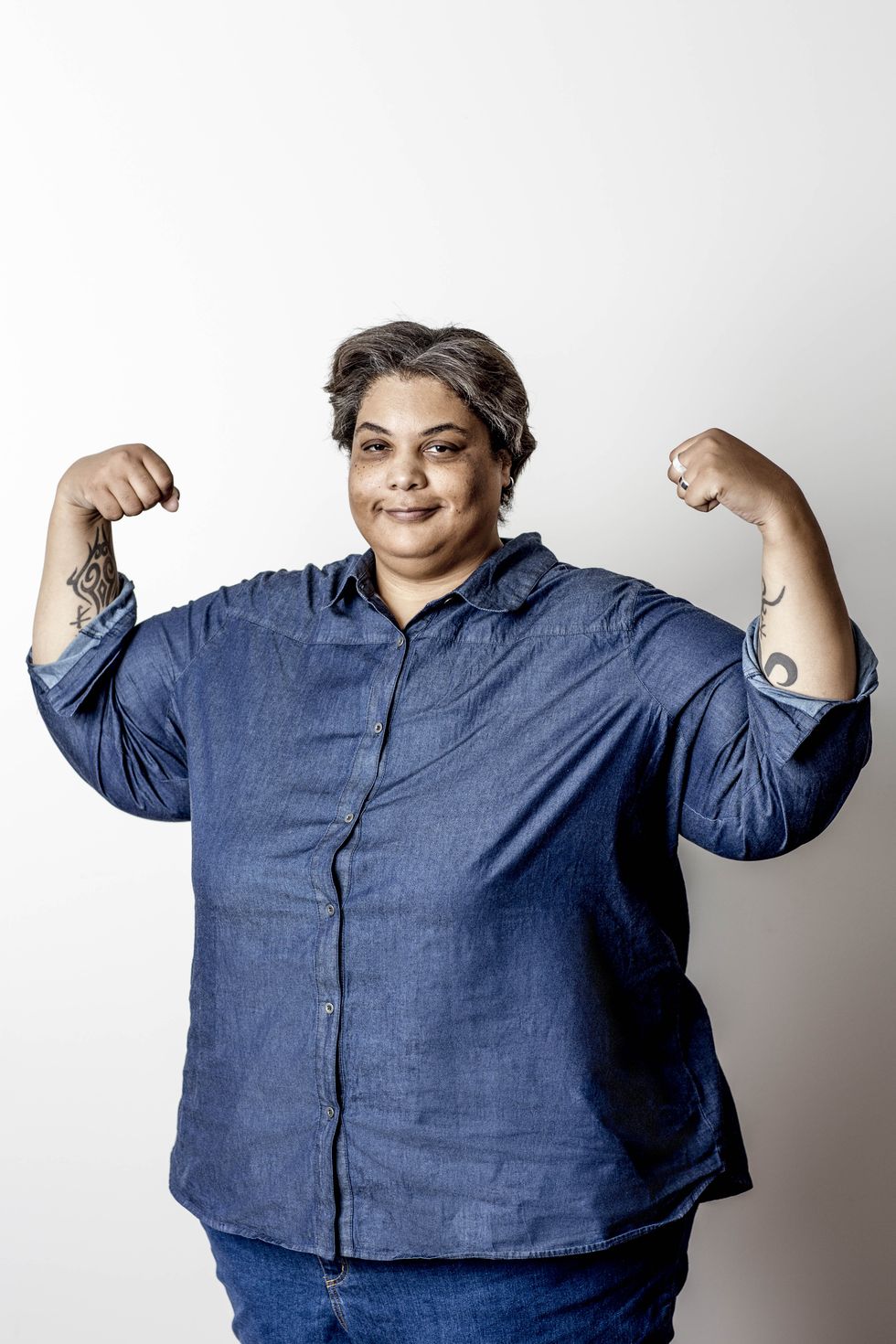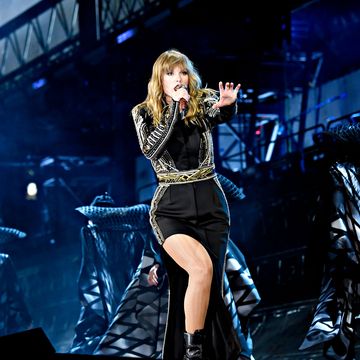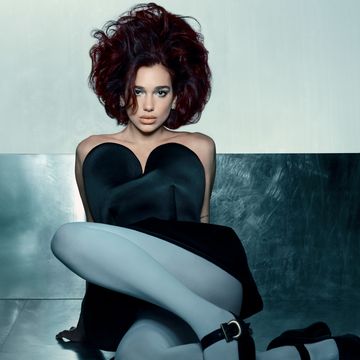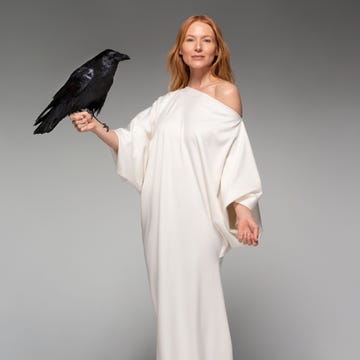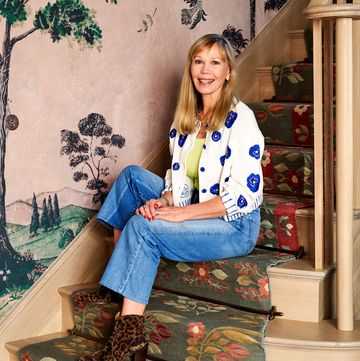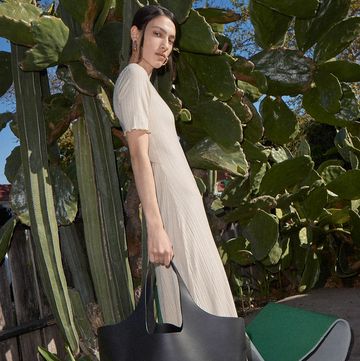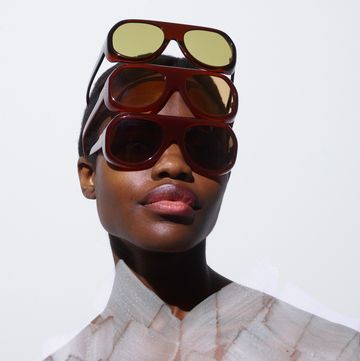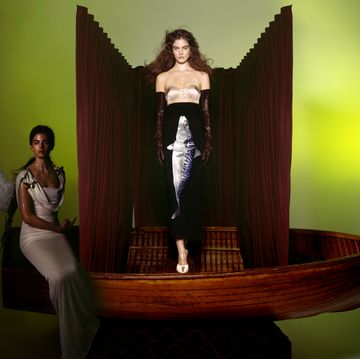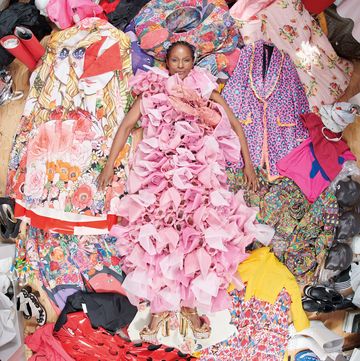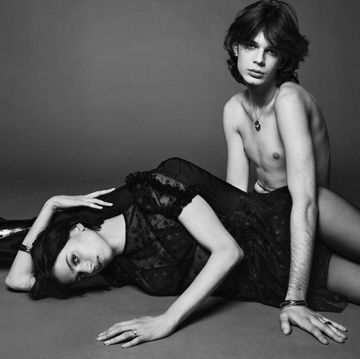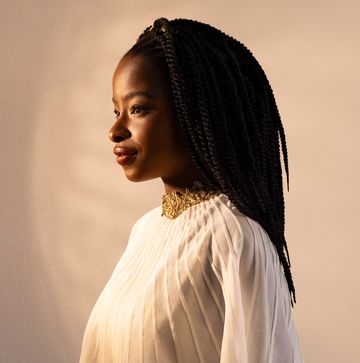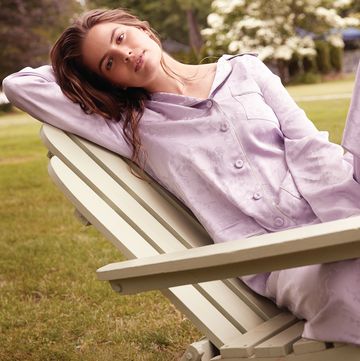This article originally appears in the July 2017 issue of ELLE.
Roxane Gay is many things—critic, social media firebrand, college English professor, self-described "love child" of Beyoncé and Ina Garten, bisexual Haitian American PhD, and romance-novel fan. She is both utterly without shame when it comes to exposing the most raw parts of her psyche and, she says, painfully shy. But one thing she is not: coy. So in her new book, Hunger: A Memoir of (My) Body (Harper), she strips away all niceties to reveal her most painful truth: "This is the reality of living in my body: I am trapped in a cage. The frustrating thing about cages is that you're trapped but you can see exactly what you want. You can reach out from the cage, but only so far."
When we meet at her apartment in Lafayette, Indiana, where she has been a professor at Purdue University for three years, Gay looms large. At 6'3", the 42-year-old has a commanding, vaguely regal presence. I make sure to shake her hand—there's a whole chapter in her book about how she's not promiscuous with hugs, which she views as "an act of profound intimacy"—and we settle into her dark, cozy living room, which is dominated by the largest TV I've ever seen playing a Grey's Anatomy rerun on mute, leather furniture from Restoration Hardware, and stacks of advance copies of books sent by publishers for her review. A Diptyque Baies candle fills the air with the smell of roses.
"Whenever I thought about women doing books about bodies and weight, it was always women who had undergone a fitness journey or a weight-loss journey," Gay says, "and they're at the end of it, standing on the cover in their fat pants, 'Look at me—I'm so thin, I've learned so much.' " Hunger, on the other hand, isn't oversimplified or prescriptive. It is visceral and confrontationally honest, and pretends to resolve nothing in the pursuit of either outer beauty or "inner peace"—and is thus quintessentially Roxane Gay.
Gay is neither an overnight sensation nor a millennial, but if you know her only by her writing, you might mistake her for both. She's been issuing rants and opinion pieces online for almost a decade, attracting an early Internet following for, say, documenting her unrequited love for her UPS man, or offering instructions on "How to Be Friends with Another Woman" (Rule No. 1: "Abandon the cultural myth that all female friendships must be toxic, bitchy, or competitive. This myth is like heels and purses—pretty but designed to SLOW women down") on her own Tumblr, as well as the feminist sites Jezebel and The Hairpin, and the pop culture site The Rumpus, where she was a founding editor. But it was not until the publication of her best-selling 2014 essay collection, Bad Feminist—in which Gay expounded upon everything from rape culture to the wish fulfillment of Sweet Valley High, building a case that feminism was too obsessed with a certain kind of intellectual perfection—that she became a go-to voice on the ever-roiling front line of gender, race, and politics, and, perhaps most of all, the embodiment of intersectionality. In her smart, clipped, exceedingly direct (and Twitter-friendly: Gay's steady stream of commentary has attracted 205,000-plus followers) style, Gay expresses a mix of innate contrarianism and warts-and-all vulnerability that seems uniquely unconcerned about her own likability or attaining anyone's approval. When The Birth of a Nation writer/director/star Nate Parker's college rape accusations came to light, her lightning-rod New York Times editorial, "Nate Parker and the Limits of Empathy"—in which she wrote, "I cannot separate the art and the artist, just as I cannot separate my blackness and my continuing desire for more representation of the black experience in film from my womanhood, my feminism, my own history of sexual violence, my humanity"—was among the most talked about in a maelstrom of think pieces.
The past few years have seen an outpouring of words from Gay, in the form of a 2014 novel, An Untamed State; a 2015 TED Talk; a 2016 graphic novel for Marvel, Black Panther: World of Wakanda; a short-story collection, Difficult Women, released this past January; and a barrage of opinion pieces unleashed in the New York Times, the Nation, the Guardian, and Salon. If there's a through line to her writing, she says it's exposing the unreasonable standards to which women are held, both by society and by each other, a reality Gay finds exhausting. "I think that I write about women's lives in ways that allow people to be seen, and allow people to think about the world they are living in and the politics of this world without feeling like they are being judged or shamed for being imperfect," she says.
Writer Sheila Heti, author of the experimental novel How Should a Person Be?, recalls seeing Gay at a chichi New York literary party. "She just stood there with her back up against the wall, frowning slightly, looking around warily, as if she didn't want to be tricked or seduced," Heti says. "One thing I truly admire about Roxane is her independence—she is beholden to no one, and to no commonly held line of thinking. And I think she actively cultivates and protects this independence—not only by where she chooses to live, but by feeling no obligation to please."
The night we met, Gay was about to start signing 3,000 volumes of Hunger for a book tour kicking off in June. She was preparing emotionally for talking about what she says is "by far the hardest book I've ever had to write." Hunger is not a story of triumph. Rather, it tackles the question of what it's really like to live in a fat body—"and not Lane Bryant fat," Gay says. "What is it like to be fat-fat? We don't see that narrative. When we think 550 or 570 pounds, we think of My 600-lb Life, people who are bedridden, who don't get to be in the world or have jobs. What is it like to be active in the world and obese?" She adds, "I hate that word. But let's get real. Let's talk about really high numbers."
In short, nonlinear chapters, Gay traces her life from childhood to the present, covering family and trauma, but also her ambivalence about The Biggest Loser and her failure rate with Blue Apron meal kits. In one passage, at a speaking engagement at the beloved New York City used-book store Housing Works, she struggles for five minutes in front of a packed house to climb onto the elevated stage (there are no stairs), until another writer helps pull her up. Once up there, she sits on a wooden chair and hears it crack. For the remainder of the evening, she hovers in a kind of squat, terrified she'll break the chair in front of an audience. Afterward, back at her hotel, "I sobbed because the world cannot accommodate a body like mine and because I hate being confronted by my limitations and because I felt so utterly alone." She writes about having to bring her own seat-belt extender on planes (she's now successful enough to stipulate first-class flights to all speaking engagements); about people who've seen her on TV, e-mailing or tweeting to inform her "that I'm fat or ugly or fat and ugly. They make memes of me with captions like 'Typical Feminist' or 'The Ugliest Woman in the World'"; about going to an emergency clinic and watching the doctor write as her diagnosis "morbid obesity" before noting the ailment she was actually there for, strep throat.
Gay's parents met in the U.S. after moving from Haiti in their late teens; the family moved frequently for her father's job as a civil engineer—Nebraska, Illinois, New Jersey, Colorado. They are both thin: Her father is 6'4" and weighs 145 pounds; her mother, who stayed home with Gay and her two younger brothers when they were growing up, is 5'2"—"and Lord knows what she weighs," Gay says with a little laugh. In Hunger, her parents are a near-constant presence, suggesting new diets, hounding her about her health, a vigilance that reads on the whole as the classic well-meaning parent who doesn't know when to quit. "They're stubborn, and I accept that," Gay says.
She told them not to read the book. Not because of how they're portrayed, but because of the unflinching account of the event that not only derailed her childhood but became a catalyst for her weight issues. When Gay was 12, she was brutally gang-raped by a male friend and several of his friends. She writes, "I remember their smells, the squareness of their faces, the weight of their bodies, the tangy smell of their sweat, the surprising strength in their limbs." Almost immediately afterward, she turned to food for numbness and protection. "I ate and ate and ate in the hopes that if I made myself big, my body would be safe." In less than three months of her freshman year in high school, she gained 30 pounds.
Eventually, Gay told a high school counselor and a few fellow "drama geeks" what had happened. But while her parents sensed that something had gone horribly wrong, they only learned the real source of her grief decades later, when she wrote about it in Bad Feminist. After the book, her mother recalled the psychiatrist she'd visited when Roxane was a teen, who advised her to investigate her daughter's relationships with friends and family, to no avail. "They just couldn't figure out what the problem was," Gay says. "I think that a lot of these questions have been answered—to at least know what happened to change their child this much. Because I did change, very drastically."
At elite New Hampshire boarding school Phillips Exeter Academy, Gay says fellow students didn't know what to make of her—a black student who was neither from an impoverished background nor the inner city. It was there that Gay started to write every day. She got into Yale, changed her major three times in two years—from premed and biology to architecture to English—and dropped out in 1994, the summer after her sophomore year, to fly to San Francisco to meet a fortysomething man she'd met in a chat room: "For the first time in my life, I felt wanted, and though I felt no real desire for this man, being wanted was enough," she writes in Hunger. She told no one where she was going, breaking off contact with her family completely. Thus began what Gay calls her "lost year." After a few weeks in San Francisco, the man invited her to Phoenix, where he lived. She spent nine months there working the graveyard shift as a phone-sex operator—talking to men without having to be touched by them. Her parents eventually tracked her down, Gay thinks via a private investigator, but Gay wasn't ready to come home. Soon, though, things really went south: She got evicted and took off for Minneapolis to meet a woman she'd met online, who she thought was "the love of her life." The relationship lasted all of two weeks. Gay panicked and called her dad, who sent her a plane ticket to come back to Omaha, where his company was headquartered. "He fathered me," she writes, "despite everything I was doing to be unparented."
Eventually, Gay finished her undergrad degree at Vermont College, then a master's in creative writing at University of Nebraska–Lincoln, followed by a PhD in rhetoric and technical communication at Michigan Technological University, in the state's rural Upper Peninsula. There, a "macho man" boyfriend she met playing poker at a casino became "the first man who touched me with any kind of gentleness, even when I asked him not to."
At first, she says, she met most of her lovers online "because it felt safer and I could be sexual without having to actually be sexual. Then, as I got fatter, it was a way to meet people and hopefully charm them with personality before having to show them the truth of my big body." Her weight gain was gradual but also felt like it "just appeared on my body one day. I was a size 8 and then I was a size 16 and then I was a size 28 and then I was a size 42."
When she finally discussed her rape with her parents after Bad Feminist, Gay says, "My mom did ask, 'Why did you put this out there?' And I just said, 'Why wouldn't I? I'm not ashamed of it.'" Gay's friend, novelist Jami Attenberg (The Middlesteins, All Grown Up), notes that "bravery is a necessary quality for being a writer. We all have to be willing to take risks if we want to make great art." The thing about Gay, though, is "not everyone does that thing—she's basically cutting open a vein and bleeding onto the page—so easily. I think it just feels natural and true to her. I can't think of any other writer in our generation who inspires such passion in her audience. I've stood with her at conferences and festivals and watched people just lose their minds around her."
Her fans, Gay will be the first to admit, are an intense bunch—one that has grown exponentially. In 2013, she was playing small literary fests and bookstores with 50 to 60 people. Now she sells out venues of 500-plus, and sponsors telecast her lectures to overflow rooms. In 2015, UCLA students lined up six hours in advance to get a seat. The majority of the attendees, she says, are roughly 24 to 35, "but I have older fans, and a surprisingly robust contingent in junior high and high school," she laughs. "There are a lot of really woke parents who are exposing their children to feminism and cultural criticism at younger and younger ages. Not a signing goes by where I don't look at a kid with braces and think, really?" The personal nature of her writing—even her fiction, which feels only a stone's throw from her own truth; the novel An Untamed State, for instance, is about the American-born daughter of a Haitian construction magnate who is kidnapped and raped while on vacation in Haiti—gives fans the impression of an intimate connection. "Sometimes they want to talk to me about their work; sometimes they want to unburden themselves with their own histories of trauma; sometimes they just want to say, 'We should be best friends.'" But Gay's verbal exhibitionism has a clear cutoff point; her current personal life, for starters, is off-limits. When astrological signs come up—she's a Libra—I mention that I'm a Cancer. "I know a Cancer very well," she says. "Let's just leave it like that." In Hunger, she makes several references to "my person." Is that a friend? A life partner? She pauses. "I'll just say it's a best friend," she says. "The boundaries I have are about privacy for other people in my life. The dream was always to just write a good book, and everything else"—fame, in other words—"is weird and cool, but not part of the plan, and it wasn't a plan for the people in my life."
As it says in Gay's Twitter bio, "If you clap, I clap back." That is to say, if you bite, she will likely bite back, with not just fury but with a stroke of lightning-fast, spot-on rhetorical jujitsu, much to her fans' delight. (It's also true that she doles out generous praise for actor/writer/friend Amber Tamblyn, indie bookstores, baby elephants, and Patricia Lockwood's Priestdaddy.) In 2015, Gay got into a heated, widely followed Twitter debate with The Wire creator David Simon, about news coverage of protests over campus racism at the University of Missouri. She regularly unleashes her ire at whatever hotel or airline has failed to meet expectations. And the day we booked this meeting, she put prospective interviewers on notice, tweeting, "If you ask me terrible questions about Hunger, I am going to give you a terrible answer. So."
This social media fearlessness feels antithetical to the woman who writes, in her new book, "I am hyperconscious of how I take up space." Gay acknowledges the contrast. "Because I'm shy, it was always easier for me to express myself online. I feel like a superhero—I can do anything online," she says. Online, "I'm going to stand up for myself, and no, you aren't going to talk to me like that." But without the cover of that digital alter ego, she says, "I'm back to, Oh God, I don't dare speak or have an opinion. Don't make a mess, don't make trouble!"
That said, Gay seems to be getting increasingly comfortable with being a superhero IRL, too. Earlier this year, she boldly canceled another forthcoming book of essays, How to Be Heard, after her publisher, Simon & Schuster, signed alt-right provocateur Milo Yiannopoulos. "I'm not interested in doing business with a publisher willing to grant him that privilege," she told Newsweek at the time. When the publishing house later dropped Yiannopoulos after the resurfacing of a joke he made that seemed to condone, incredibly enough, priests molesting young boys, Gay doubled down on Tumblr: "In canceling Milo's book contract, Simon & Schuster made a business decision the same way they made a business decision when they decided to publish that man in the first place."
In Hunger, Gay sets her sights on the body-love movement. While she calls it "profoundly necessary," she also maintains that the push for self-acceptance does not extend to bodies like hers. "Many of the people who are talking about body positivity are size 12, size 14, even size 16. I understand there is a lot of cultural pressure for women that size to be smaller, but I'm like—honestly, you have a problem being positive about your body? Really? For me, in this body, it's hard to take that seriously," Gay says. At her heaviest, in her late twenties, she weighed 577 pounds. She's now about 150 pounds less. "If you're a size 42, how do you feel body positive? How on earth do you get there? Not because you can't be beautiful. But because it's so hard to go into the world in that size. And [the body-positive people] just don't know. They don't even think about it. They think, This is it, this is as fat as it gets."
Being obese "in many ways, erases your gender identity," Gay says. "People just treat you like nothing. You can hide lots of problems, but you can't hide fatness. And you can't hide race." The intersection of the two is "interesting," she says. "Certainly there is less cultural stigma in black communities about fat than there is in white communities. But the kinds of fat that are acceptable in black communities—there's a limit."
Gay maintains that most people are better equipped to discuss race than they are weight. "Even though the conversations, especially since November, have regressed, I still think we have better tools for these conversations," she says. "There are things people won't dare say [about race], at least in public. But when it comes to fat, we don't have the tools, we don't have the language, we don't have the rules for how we talk about it. So we are not as evolved—which is saying something."
This, according to Nigerian American journalist Ijeoma Oluo, who recently appeared alongside Gay at a literary lecture series in Seattle, is why Hunger could have real impact: It puts a black woman at the center of a conversation about weight and body that they're usually cut out of, simply by virtue of being, Oluo says, "so far down the ladder for what people find acceptable in women." Gay has become a specialist in this kind of inconvenient truth. "Roxane is always willing to take that hit—to be the person who'll say the thing that's honest, even if it's seen as counterproductive. She's not just a young, chubby, borderline-size-14 white girl talking about how hard it is to be fat. She's in no way a mean person; she's considerate and kind. [But] we want women to be likable and bending over backward to please time and time again. She doesn't do that."
Toward the end of Hunger, Gay writes, in her breathtakingly direct way, "I have no idea where the bottom of my shame resides." In person, she expands on this idea. "What is the rock-bottom moment of being fat, before I really get my shit together? I don't know. It's hard to find that." She writes about going to a consultation for weight-loss surgery and deciding against it. Right now she is seeing a nutritionist in Indiana who has a colleague in Los Angeles, where Gay recently rented an apartment. She's trying to eat three meals a day rather than skipping meals and overeating at dinner. She's even planning to read a self-help book about mindful eating, though she hates the genre. "I feel like I have to believe that I'm going to overcome it one day, soon," she says. "I know that I've overcome worse."
But in Hunger she admits that the weight continues to serve its original purpose, buttressing her body against the risk of inviting sexual attention. "Trauma caused the weight gain—this fear of being small that caused me to maintain this weight for many years now," she told me in Indiana. "I do think I've resolved most of those issues, but in the process of gaining this much weight, I've developed a whole new set of issues, especially around food and eating." Now, she says, "I'm just trying to unfuck all the processes in my head that I've fucked up in the past 20 or 30 years."
The female body, in all shapes, Gay says, is a "final frontier, along with disability, that people can openly mock and demean and get away with treating with utter disregard." The only possible solution she sees is "a huge amount of empathy. Kindness," she says. "And people minding their own goddamn business." Whether or not most readers relate to the statistics of Gay's body, few will be able to finish her book without gaining a deeper understanding of her reality. "I don't have a fantasy of a thin woman waiting to come out," Gay says. "My fantasy would be to be able to walk down the street without being yelled at by someone. To walk through an airport without having someone point at me." This is the true shock of Gay's book—it is not the revelation of her actual weight, though how many of us, of any shape or size, would have the guts to put that on paper? It is the far deeper reveal: that a woman so accomplished, so seemingly fierce—in some circles, so revered—has been forced to "fantasize" about something so fundamental. "I don't delude myself into thinking that if and when I reach [a certain] size, all my problems will be gone. Many of them would be different. At least I'd feel better in my body, better leaving my house," she says. "My dreams have really become sad at this point—human dignity dreams."
